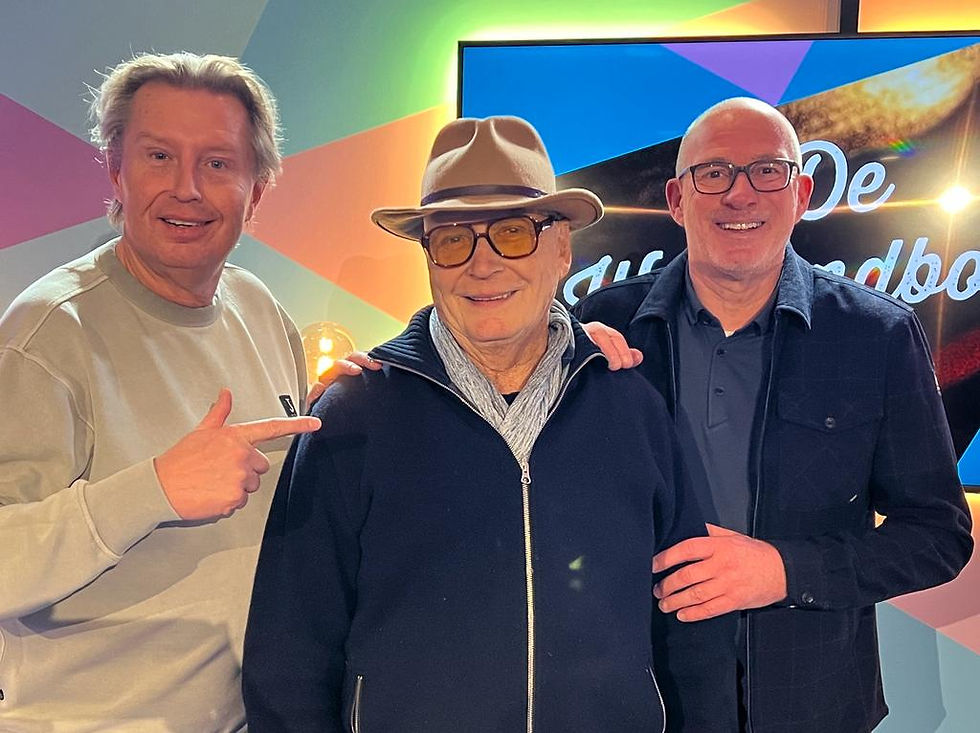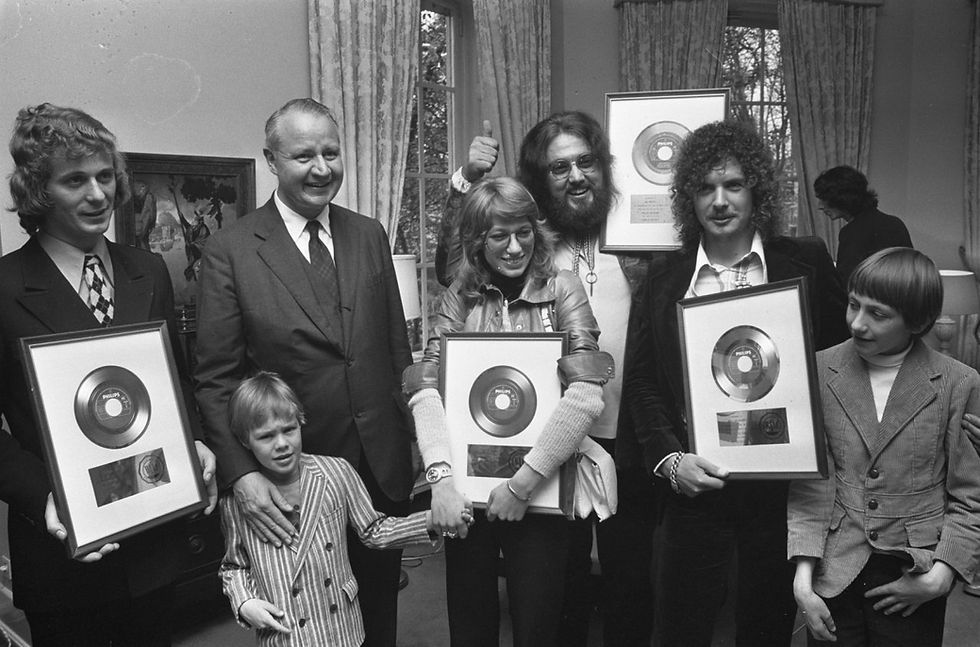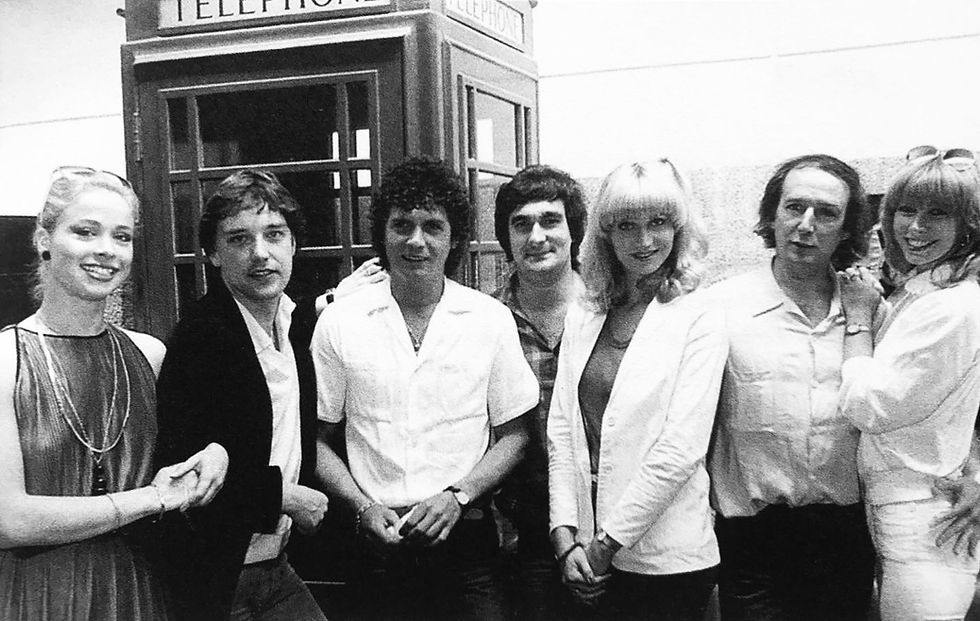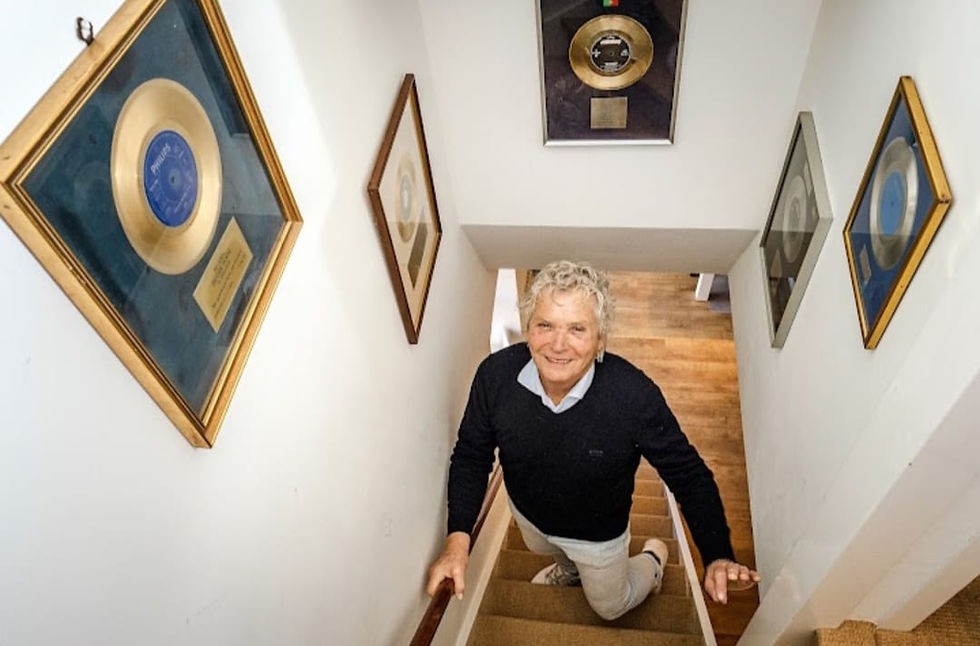The Godfather of Dutch pop music, Hans van Hemert, on "De Weekendborrel"
- Ralph Ruiz
- 28 janv. 2024
- 6 min de lecture

Jan Paparazzi, Hans van Hemert and Corné Klijn
On January 5th, Jan Paparazzi and Corné Klijn interviewed the legendary producer and songwriter Hans van Hemert on the AVROTROS/NPO Radio 5's show "De Weekendborrel". Click here to listen to the interview.
In addition to Luv', Hans produced hits for many other artists and bands (Q65, The Motions, Ro-d-ys, Zen, Group 1850, Big Wheel, Sommerset, Cardinal Point, Ramses Shaffy and Liesbeth List, Sandra & Andres, Mouth & MacNeal, Kamahl, American Gypsy, Vulcano, André Hazes, Glennis Grace...). He wrote three songs that represented the Netherlands at the European Song Contest: "Als het om de liefde gaat" by Sandra & Andres (#4 in 1972), "I See A Star (Ik Zie Een Ster)" by Mouth & MacNeal (#3 in 1974, the year ABBA won it) and "The Party's Over" by Sandra Reemer (#9 in 1976).
In 2017, Hans won a "Lifetime Achievement Award" at the Buma Awards (the most prestigious music ceremony in the Netherlands). This prize rewarded the maestro's outstanding contribution to Dutch music.

Hans discussed his greatest productions. "A lot of people don't know what a producer is. You can compare a producer with a director for a TV show. The producer decides how a song will sound. When I started my career, the producer ensured the artist felt good in the studio. I decided to become a producer. One night, I recorded a demo with my band in a studio with the help of a renowned sound engineer. We played the recording during a meeting at the record company. Everybody loved it, whereas I heard that it would take seven years before I became a producer," Hans said.
Luv's Pygmalion mentioned his family: "I'm from a family of actors and directors. My brother Ruud made films. My father was the first to direct dramas on Dutch television. My family was very creative. My dad filmed the TV series "Dagboek van een Herdershond", which later became a musical. Albert Verlinde, who produced the musical, approached me and explained his plans. My older daughter sorted out all the details with Verlinde's team. My sister Ellen is an actress and married my hero, Coen Flink. My little brother Eric is also very creative".
"How Do You Do" is Hans's most successful production. "Wij houden van Oranje" by André Hazes, "You're the Greatest Lover" by Luv' and "How Do You Do" by Mouth & MacNeal are the three songs that generate the most income from Buma (the Dutch copyright society). "How Do You Do" sold 6 million copies worldwide. Five hundred cover versions of this track were recorded, from South American renditions with bandoneon to disco and techno versions, like the one the famous German act Scooter did. I never thought "How Do You Do" would be a hit because it cost so much effort. After Willem (Duyn) recorded it in the studio, I went to the vocal booth and noticed a puddle of sweat on the floor. I brought together two contradictory elements: a big man and a fragile girl. I imagined that this man approached the girl and asked her: "How do you do?" Hans explained.

Hans van Hemert, Mouth & MacNeal, Harry van Hoof getting a gold record for "How Do You Do" (1 million certified copies in the USA) from the Recording Industry Association of America (1972)
Mouth & MacNeal were a popular duo, but the chemistry between them wasn't right. "That's the problem when you bring people with a different character together. Willem Duyn was the singer of a band called "Jay-Jays". His voice was difficult to record by a sound engineer because it was too loud," Hans added.
When asked how he came up with the track "You-Kou-La-Le-Lou-Pi", Hans answered: "I told Mouth & MacNeal I took a study trip to Africa, and the Swahili language inspired me. This story wasn't real, and Mouth & MacNeal believed it. That's how they sang "You-Kou-La-Le-Lou-Pi".

Mouth & MacNeal received a gold record for "Hello-A" from Sandra & Andres. Hans van Hemert wrote this hit single (1972)
Here's what the Pop Maestro said about other acts he worked with and other issues:
Sandra & Andres: "They were incredibly successful in the Netherlands, Germany, Scandinavia and France. During the Eurovision Song Contest, they were in pole position for a short moment during the announcements of the results. I wore a wool tuxedo, which was so itchy. I told myself, "If they finish first, I'll have to wear this tuxedo longer". In the end, they finished fourth".

Cardinal Point (an Italian band originally named "I Punti Cardinali". They anglicised their band name into Cardinal Point): "One day, I was asked to work with "I Punti Cardinali". They were Sicilian. I did a record with them called "Mama, Papa". It became an instant hit. Until then, they were just a nightclub band. These guys considered me a god due to this success. One of the boys married in Sicilia and invited me to his wedding. I was celebrated there as if I were a mafia member".

Veronica Unlimited: "I recorded a demo and sent it to a German music publisher. I asked them: "Do you know nice models who could lipsynch to it?". Actually, Piet Souer, José Hoebee (of Luv'), Margriet Eshuijs and I recorded the vocals on "What kind of dance is this?".

Trinity: "Every Monday, we had a repertoire meeting at the record company. Trinity was one of the groups submitted to me. They wrote good songs".

Peter Koelewijn: "After I had success with Luv', other producers launched girl trios. Dolly Dots were more clever because they were six (two times three). Peter Koelewijn did a single with Babe. Both of us had an office in Wisseloord. He approached me and wanted to know my opinion about his girl group. I didn't like it. He asked me the most diplomatic question: "Do you think it sounds and looks like Luv'?". To me, it felt like an insult. I answered him: " No, it doesn't sound like Luv'". Then, he went to the label manager, who asked him: "What does Van Hemert think about it?" "Don't worry, he's okay," Koelewijn replied".

Babe with Jan Rietman, Hans van Hemert, Ludo Voeten and Peter Koelewijn at Wisseloord studios in 1981
Luv': "I was watching "Musikladen" on TV. Silver Convention were performing. When I saw them, I said to myself: "I'm going to do the same but with more accessible ladies". I wanted three attractive girls. I wanted parents to say to themselves: “It would be nice if my daughter became a member of such a group.” I told my wife: "I'm going to launch a group with a blonde, a red-haired and dark-skinned girl". She replied: "What? How are you going to do it?". Patty Brard had applied for a job in my office as a secretary. I started to rehearse with her, but she was not good as a singer. But she was charismatic and had a personality. Then we needed a blonde and someone who could perfectly sing. During the sessions for "You're the Greatest Lover" in Wisseloord studios, José suddenly stopped singing and asked me: "Hans! What do we have to sing instead of "Shananana"?" I answered: "I'm going to the WC. When I'm back, I'll find appropriate lyrics". I never changed the Shananana. It worked perfectly".

Hans van Hemert, Pim ter Linde, Patty Brard, Marga Scheide, Piet Souer and José Hoebee celebrating "You're the Greatest Lover" as a #1 hit on the Dutch Top 40 (1978)
Vulcano: "The people at the Eurovision asked me if I had a good track to represent the Netherlands. This year, all the songs at the preselection had to be sung in Dutch. I wanted Vulcano to be a follow-up to Luv'. I wrote two nice songs: "Met jou d'rbij" and "Een beetje van dit". Bernadette won the Nationaal Songfestival due to the fact that the Limburg province didn't vote for Vulcano".

The 1974 Eurovision Song Contest, which saw ABBA's victory: "In the 1970s, a Swedish band covered many of my songs. In my mind, I remember it was a group with two girls. In Brighton, there was a party with all the Eurovision contestants. I was a bit drunk, met two Swedish female singers, and told them: "Hey, I'm Hans van Hemert, and you recorded my songs!". So, I sang songs Accapella to convince them. The ladies looked at me, embarrassed and left the room. It turned out that these ladies were Agnetha Fältskog and Anni-Frid Lyngstad of ABBA. I was such a loser that night!"

ABBA: the winners of the 1974 ESC
Kamahl: "The AVRO boss, Ger Lugtenburg, organized a gala for the World Wide Fund for Nature. Frank Sinatra was supposed to be the main guest. I was commissioned to write a song Sinatra would perform on this occasion. I wrote the song entitled "The Elephant Song". Two weeks before the WWF gala, Ger called me and said Frank Sinatra would not come. He wanted to know if I knew another star who would perform as a replacement. The Dutch Royal Family and the government were supposed to attend this event. I called Phonogram's senior vice president and asked for help. He suggested Kahmal from Australia to me.

Ronnie: "Willem Duyn wrote "The Big Bear Bump". I only produced it. During a repertoire meeting, this lovely boy, Ronny Lutam, was suggested. Willem was the bear".

André Hazes: "Joop Oonk, Willeke Alberti's ex-husband, came to me. He said: "Hans, you should write a football song". Willeke, who lived in Belgium at the time, was supposed to perform "We houden van Oranje". Finally, André Hazes performed it. We disagreed on the way to sing it. The recording sessions with him were very challenging".

Source: AVROTROS/NPO 5, Facebook (Official Luv'), Luv' weblog archives...






Danke sehr schön für diesen spannenden Hintergrundbzricht.